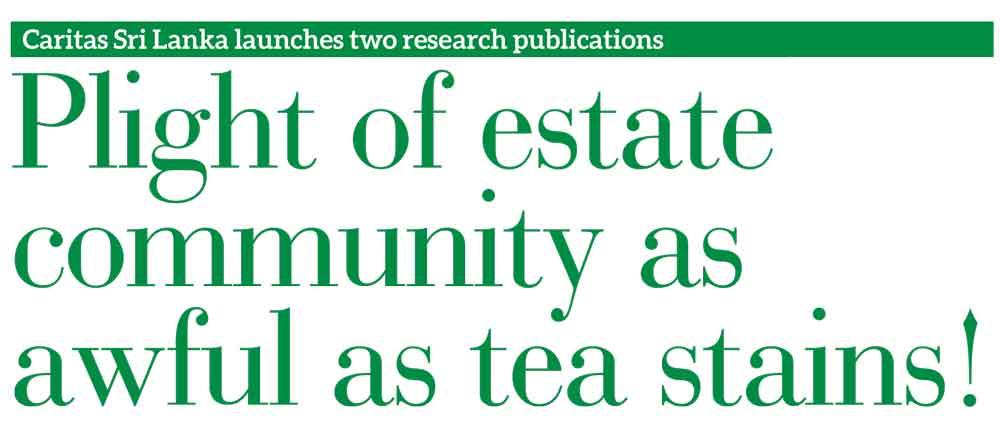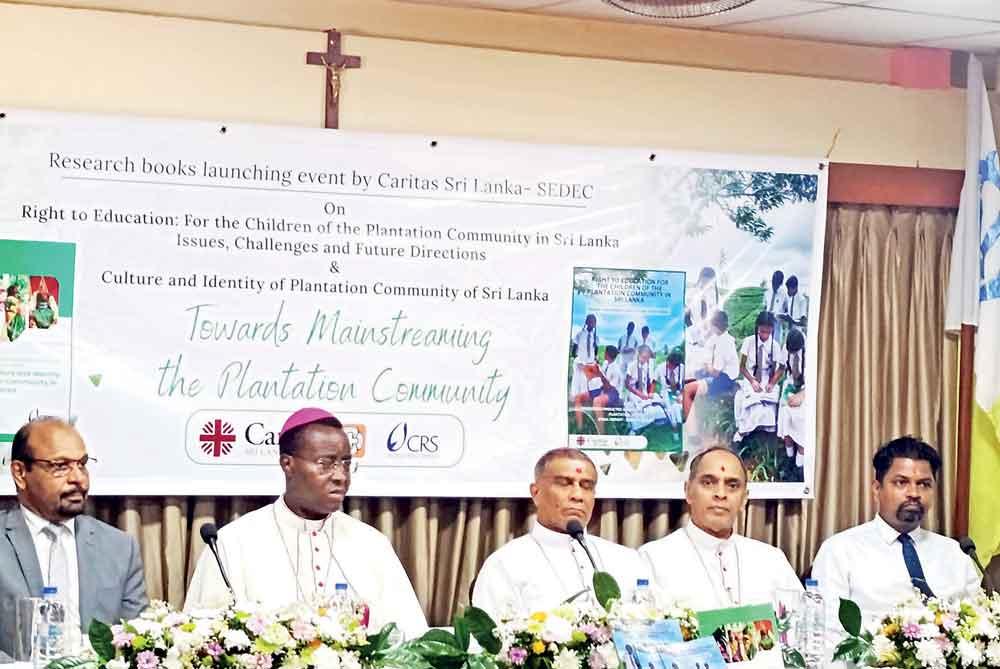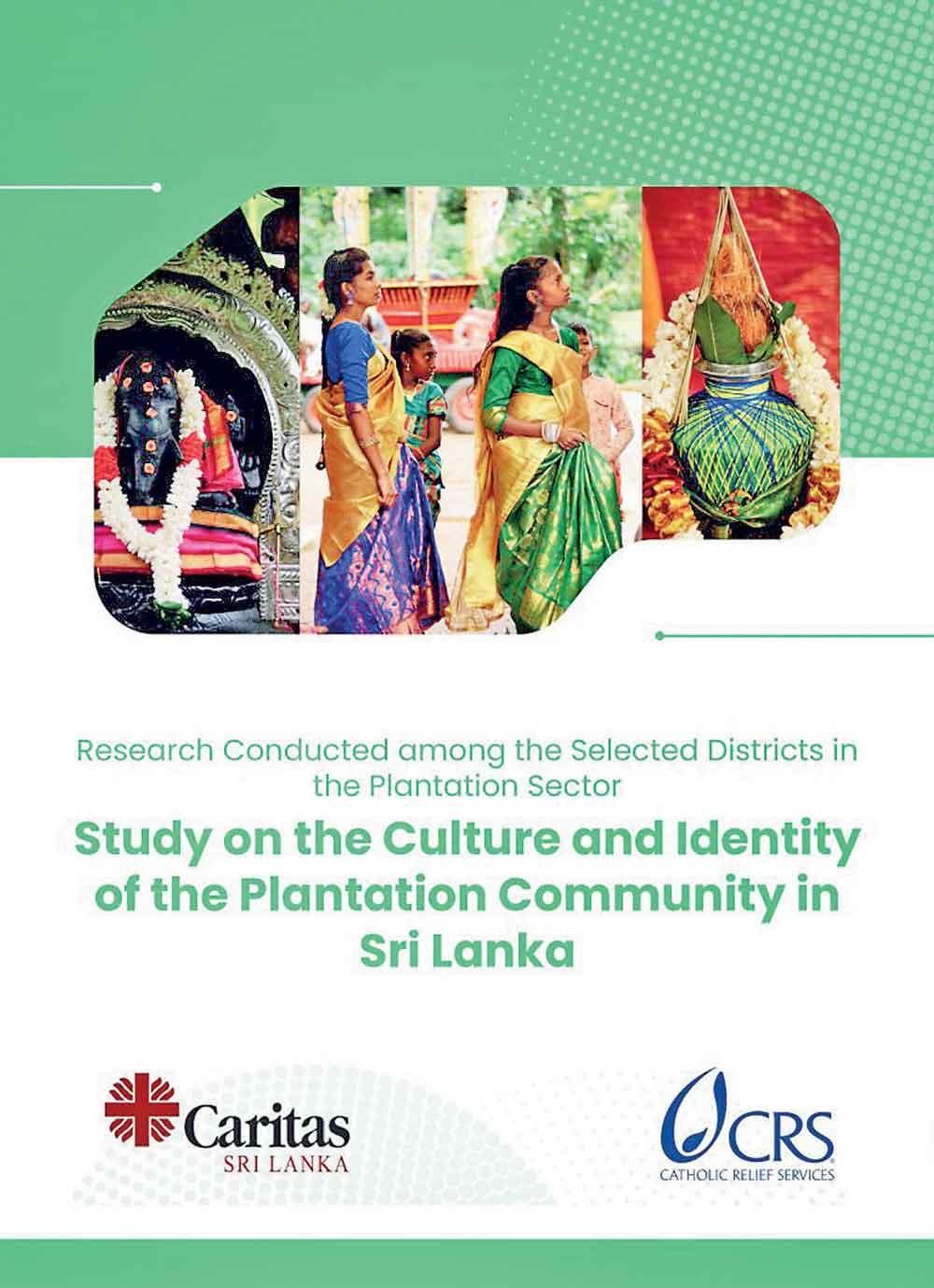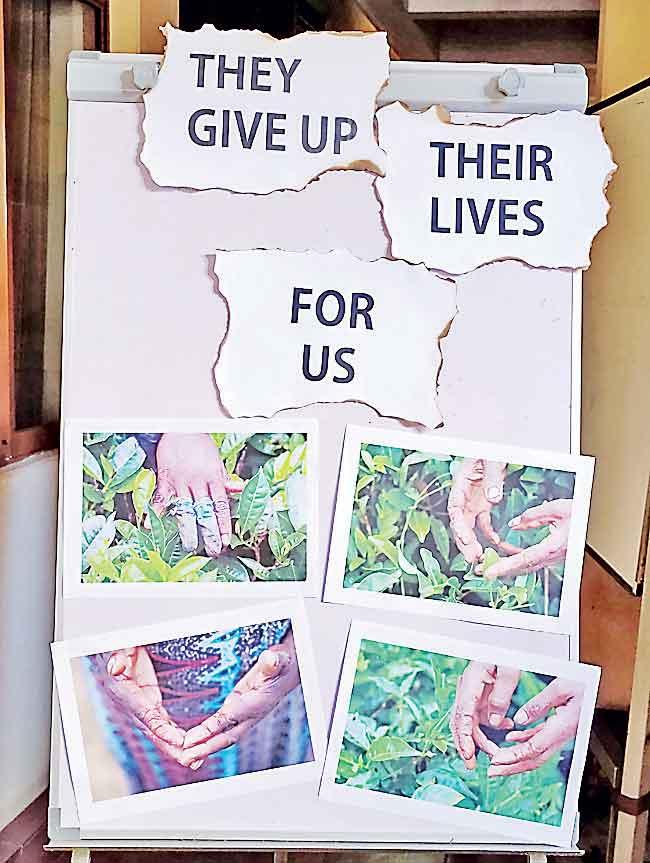15 Oct 2024 - {{hitsCtrl.values.hits}}


Caritas Sri Lanka recently launched two research publications based on a study that explored challenges faced by estate sector children in terms of their right to education and another study on the culture and identity of people in this sector. Rt. Rev Dr. Brian Udaigwe, Apostolic Nuncio for Sri Lanka was the chief guest at the event. At the head table from left: Justice S. Thurairajah, Rt. Rev Dr. Brian Udaigwe, Bishop Dr. Harold Anthony, Dr. Valence Mendis

Burning issues in the estate sector documented to protect the right to education, culture and identity of Sri Lanka’s plantation community
The unique cultural identity of the plantation community has often been disregarded leading to human dignity concerns
Many children in these communities still struggle to access quality education and better opportunities to perform well at their studies
One important observation is with regards to the literacy rate among females in the plantation sector
According to the report, 41 percent of people in the estate sector do not wear their traditional dress at their festivals
In a bid to empower and uplift the lives of Indian Origin Tamils (IOT), living in Sri Lanka’s plantation community, Caritas Sri Lanka recently launched two research publications based on a study that explored challenges faced by children in terms of their right to education and another study on the culture and identity of people in this sector. The two publications were launched at a recently held event presided by Rt. Rev Dr. Brian Udaigwe, Apostolic Nuncio for Sri Lanka as the chief guest, Dr. Harold Anthony, Chairman, Catholic Bishop’s Conference, Sri Lanka and Catholic Bishop of Kurunegala, Dr. Valence Mendis, Bishop of Kandy, Justice S. Thurairajah PC and several other dignitaries.
In his opening remarks, Fr. Luke Nelson Perera, National Director at Caritas Sri Lanka-Sedec reflected on its long history of working with the plantation community in Sri Lanka. “Our work with the plantation community is driven by our commitment to social justice and equity. Over the past 200 years the plantation community has been facing historical discrimination and marginalization. They are one of the main pillars of our export economy. Yet, they have often been overlooked and left behind in terms of access to education, healthcare and other social services. Among all these hurdles, many children in these communities still struggle to access quality education and better opportunities to perform well at their studies. Simultaneously the unique cultural identity of the plantation community has often been disregarded leading to human dignity concerns. In response to these challenges Caritas Sri Lanka conducted two essential researches focused on the right to education for children of the plantation community in Sri Lanka and a study on the identity of the plantation community. We believe that education is the key to empowerment. It transforms lives, opens doors and creates opportunities. At the same time understanding the unique culture of the plantation community is important as it gives a picture of current socioeconomic conditions and community dynamics. Therefore this research is a vital step towards understanding and caring for their needs. These academic documents would therefore be reference materials for future research. Caritas Sri Lanka’s vision and mission is to serve the needy and a voice to the voiceless as we join this journey of advocacy with solidarity,” said Fr. Perera.
Right to education
The research publication on the Right to Education for Children in the plantation community explores the issues, challenges and future directions. The constitution of Sri Lanka acknowledges the right to universal and equal access to education at all levels, with compulsory education for children aged 5-16. Despite significant improvements there’s still more work to be done to ensure equal access to education. The study concluded that the Sri Lankan education system needs urgent reform to address emerging issues in the plantation community with regard to policymaking, implementation, and regulatory levels. One important observation is with regards to the literacy rate among females in the plantation sector. The research indicates that the literacy rate in the plantation community still lags behind that of the non- estate rural population. This gap is more pronounced for females, who lag their rural counterparts by 16% while the gap among males is only 6% (World Bank, 2007).
The research further revealed that the estate sector exhibits a high dropout rate, with an average of 8.4 percent in grade five, compared to the national average of 1.4 percent, as reported by the Ministry of Education. In the Nuwara Eliya district, the male transition rate from primary to secondary levels is lower than in other districts, with many boys being forced to join the workforce. Additionally, children in plantation communities are less likely to complete both primary and secondary education than their urban counterparts.

In addition, external factors that hinder children’s education including the distance to travel from home to school, challenges faced by teachers when commuting to school, expenses that need to be borne by parents in order to send their children to school, dependence on alternative sources of income such as Samurdhi, monthly income versus monthly expenditure when sending their children to school are also being discussed.

“Our work with the plantation community is driven by our commitment to social justice and equity. Over the past 200 years the plantation community has been facing historical discrimination and marginalization. They are one of the main pillars of our export economy. Yet, they have often been overlooked”
- Fr. Luke Nelson Perera, National Director
at Caritas Sri Lanka-Sedec

In its recommendations, the study indicates that accessible transportation, a secure environment, involvement of the community in educational activities would also encourage people in the plantation sector to send their children for such activities.
Culture and Identity
Lighting the Lives of the Plantation People Project was developed by Caritas Sri Lanka to empower the lives of the plantation community, improve quality of life with access to basic services, resources and opportunities. Some of the objectives of the project were the formation of a network of CSOs at the provincial and national levels, constructive advocacy and lobbying for issues of the plantation community and solutions-based approach to community empowerment and welfare. The study based on the culture and identity of the plantation community revealed numerous intriguing cultural and identity phenomena, including the fact that 55 percent of youth learn traditional features from their elders or parents and continue to practice them in their daily lives on the estates. According to the report, 41 percent of people in the estate sector do not wear their traditional dress at their festivals. The survey also discloses their level of education, participation in political debate, religious activities, and so on, attempting to provide a comprehensive picture of the IOT community’s challenges in the country. On the one hand, a significant number of IOT are attempting to unite their culture and identity; nonetheless, integration into the dominant culture is also common
The genesis of the plantation community can be traced back to the British colonial administration’s need for cheap labour to cultivate cash crops in Sri Lanka. The report explores the level of unemployment within the estate sector, major festivals that are being celebrated, sanitation facilities where round 27% use pits with a non-waterproof deck, ceremonies such as postnatal care, kaadha kuththu - one of the significant rituals where ears of the girl child are being pierced, coming of age rituals, pre-wedding customs, Valaigappu ritual for expectant mothers, funeral rituals, Kaamankuthu - a ceremonial event that takes place during harvesting season. The document also indicates that around 97% of people in plantation communities have no land ownership.
The study further recommends that the government should implement inclusive development policies, advocacy programme for cultural preservation funding, recognition and legal protection, promote culture-based and eco-tourism programmes, cultural documentation and archiving, inter-community dialogues and networks among others.
25 Dec 2024 9 hours ago
25 Dec 2024 9 hours ago
25 Dec 2024 25 Dec 2024